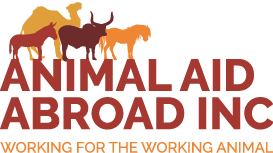AAA sponsors 8 equines at the NOWZAD Donkey Sanctuary
On the city outskirts of Kabul lies the Nowzad Donkey Sanctuary, the first of its kind in Afghanistan. It was set up in 2017 to provide facilities for sick animals in need, primarily donkeys, mules and horses. Animal Aid Abroad (AAA) is able to sponsor eight equines at the sanctuary, thanks to the much-needed donations received from generous donors.
Many equines are brought in to the sanctuary injured, underweight, severely ill from diseases such as glanders, or at the point of exhaustion from their work carrying heavy loads across the city. Our team will provide treatment and hospitalization for these animals, even offering long-term sanctuary to those animals too sick to work again.
We have three staff who work at the Sanctuary full-time to feed and care for the animals, whilst our veterinarians visit at least once a week for ongoing health checks and to give any treatments required.
To meet the costs of our sanctuary each month is always a challenge with the unpredictability and rising costs of the animals’ food – decent quality hay and alfalfa in particular - and the ever growing threat of water, veterinary medicine and food shortages. Winter months are more expensive with increased demands on electricity supplies to provide light and warmth – total costs are at least around $2000 per month.
At the Nowzad Donkey Sanctuary we currently have 2 horses, 12 donkeys, and our long-term resident bull (David), goat (Jaja) and dog (King).
Long-term donkey residents: Maqbola, Shadow, Jack, April, Dehmazang, Pat, Pat’s foal (currently unnamed and looking for one!), Rose, Khoshi, Yoda, Tom and Lola.
Long-term horse residents: Azad and Shaheen.
Vaccination Programme: We also run a vaccination programme from our sanctuary. Owners will bring their working animal for regular rabies and tetanus vaccinations and it always provides a good opportunity to give owners or handlers advice on best welfare and husbandry practices.
Working Animal Programme (WAP): Each week, our team of dedicated veterinarians makes visits to various sites around Kabul where working animals are found, to check on their welfare and health, and make any treatments onsite that are necessary.
There are approximately 5,900 working donkeys and horses in Kabul and the surrounding districts, either working as pack animals hauling loads on their backs or pulling carts usually overladen with anything from construction materials, water, food, or waste. It is a desperately hard life for these animals, many of which suffer from trauma and wounds caused by ill-fitting harnesses or carts, made so much worse by most being severely underweight or lame. Temperatures can vary from 400C in the summer to -200C in winter and, without any shelter from the elements or access to water, our team often come across collapsed animals suffering from dehydration or exhaustion.
As well as treating the animals, some of which require urgent hospitalization at our clinic or a longer-term stay at our sanctuary, Nowzad vets will also take the opportunity to educate the owners or handlers on basic animal welfare and husbandry knowledge to try and address the complicated link between poverty, livelihoods and animal welfare. They teach basic first aid to those reliant on the working animals, and will show the benefits of such practices as good harnessing and proper hoof care to the long-term health of their animal.
Our aim is to establish a fully-manned and equipped mobile veterinary clinic to treat these working animals, and further expand Nowzad’s reach to Kabul’s outlying districts. We hope the mobile unit will carry vaccines, portable stabling and shelters, water troughs, first aid kits, and farrier equipment to help prevent so many of these pressing issues and improve equine welfare in Afghanistan.












